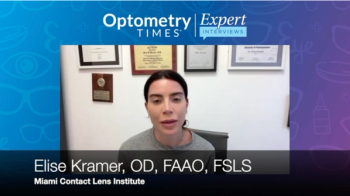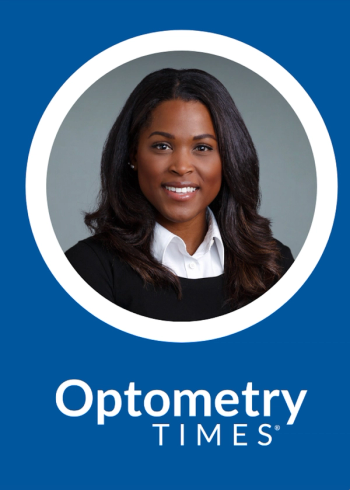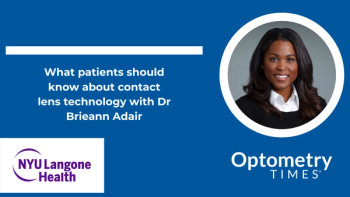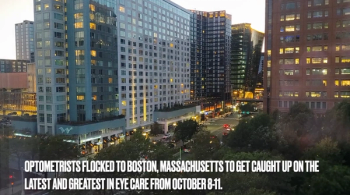
Patients, contact lenses, and the internet
I recently came across a paper while performing a search of the world’s peer-reviewed literature with the topic of contact lens compliance in mind. My search was precipitated by two things.
Bacterial ulcer
The patient I had just seen 10 minutes prior was a new patient who thought she had scratched her right eye. As it turned out, she had an ulcer that appeared to be bacterial just inferior-temporal to her visual axis. It was small, round, white, and had just a mild amount of staining with sodium fluorescein. Its location being closer to the visual axis rather than the periphery led me to suspect that it was infectious and not “sterile.”
The patient was a 26-year-old female who was not pregnant and had no known medical allergies. A frankly bleak sign was the presence of several old round scars on both corneas: evidence of prior insults. She reported noncompliance with her contact lens-wearing schedule.
I started the patient on Besivance ophthalmic suspension (besifloxacin, Bausch + Lomb) every 30 minutes in the right eye, advised her not to wear a contact lens in that eye, and invited her back the next day at 9:00 a.m.
The second thing that precipitated my search of the world’s literature on this topic was the fact that, with this occurring during a global pandemic, I had oodles of time in between patients to do so (at the time this was written, I was seeing about one patient every hour).
Survey says
So, in my quest, I came across a very timely paper out of Spain whose lead author was a cornea specialist in a hospital setting.1 The paper, “Characteristics, Behaviors, and Awareness of Contact Lens Wearers Purchasing Lenses Over the Internet,” had a title that intrigued me, especially having recently heard news that several states were dealing with entities attempting to use the COVID-19 pandemic to convince lawmakers to overturn laws banning online eye examinations for the renewal of glasses and contact lens prescriptions.2
The authors of the study sent out a questionnaire regarding contact lens hygiene to clients of an online contact lens service. Through the survey questionnaire, they collected information on demographics, knowledge of proper contact lens hygiene, and compliance. The survey took place over a 6-month period, after which the results were analyzed.
Some 1264 contact lens wearers completed the survey. The mean age of those who participated was 40.8 years, and most participants were female (71.1 percent). As one would expect, the majority (76.4 percent) were myopic. Some 63.3 percent wore monthly disposable contact lenses.
The participants who purchased their contact lenses exclusively online reported a lower frequency of eye examinations. The frequency of eye examinations was also lower among those who had begun contact lens wear on their own (without an eye doctor). The participants who had begun contact lens wear on their own were found to be less experienced.
Of the risk factors isolated from the survey, exposure to water (swimming and/or showering with contact lenses in) was common, as was use of contact lenses and/or contact lens cases beyond the recommended replacement schedule. The reuse of contact lens solution was also common.
The authors found no differences in risk-awareness or compliance between those who purchased their contact lenses exclusively online versus other contact lens wearers. They did, however, find that those who taught themselves how to use contact lenses tended to have less frequent eye examinations, poorer compliance, and increased risks for adverse contact lens related events.
Usable data
One overt characteristic of this paper that must be pointed out is the fact that this study came out of another country with obvious differences as far as laws relating to contact prescription and purchase are concerned. However, that doesn’t mean that ODs cannot extract meaningful information from it.
Those familiar with reviewing and grading scientific literature would be quick to point out that, while the sample size is sizeable, a self-reported questionnaire tends to have a lower evidence profile than, say, a double-masked randomized controlled trial with thousands of participants and a study period of several years. I would agree with that, as well. However, again, it doesn’t mean that we, in the U.S., cannot get tangible information here.
One may say off the cuff, “You can’t get contact lenses without an eye examination and a prescription in the U.S.” Yes, you can. I hate to say it, but yes, you can.
My mind almost immediately went to a young female several years ago who came in with a near total corneal ulcer from the contact lenses she bought at a flea market that a friend taught her how to wear. I immediately referred her to a cornea specialist and have never heard from her since.
ODs have an obligation to inform the public, our lawmakers, and our patients of the dangers of contact lens misuse. The potential for blinding complications is all too real.
References
1. Mingo-Botín D, Zamora J, Arnalich-Montiel F, Muñoz-Negrete FJ. Characteristics, Behaviors, and Awareness of Contact Lens Wearers Purchasing Lenses Over the Internet. Eye Contact Lens. 2020 May 14. doi: 10.1097/ICL.0000000000000702.
2. Georgia Public Policy Foundation. Foundation Joins Plea for Georgia to Allow Online Vision Care. Available at: https://www.georgiapolicy.org/2020/05/foundation-joins-plea-for-georgia-to-allow-online-vision-care/. Accessed 6/10/20.
Newsletter
Want more insights like this? Subscribe to Optometry Times and get clinical pearls and practice tips delivered straight to your inbox.













































